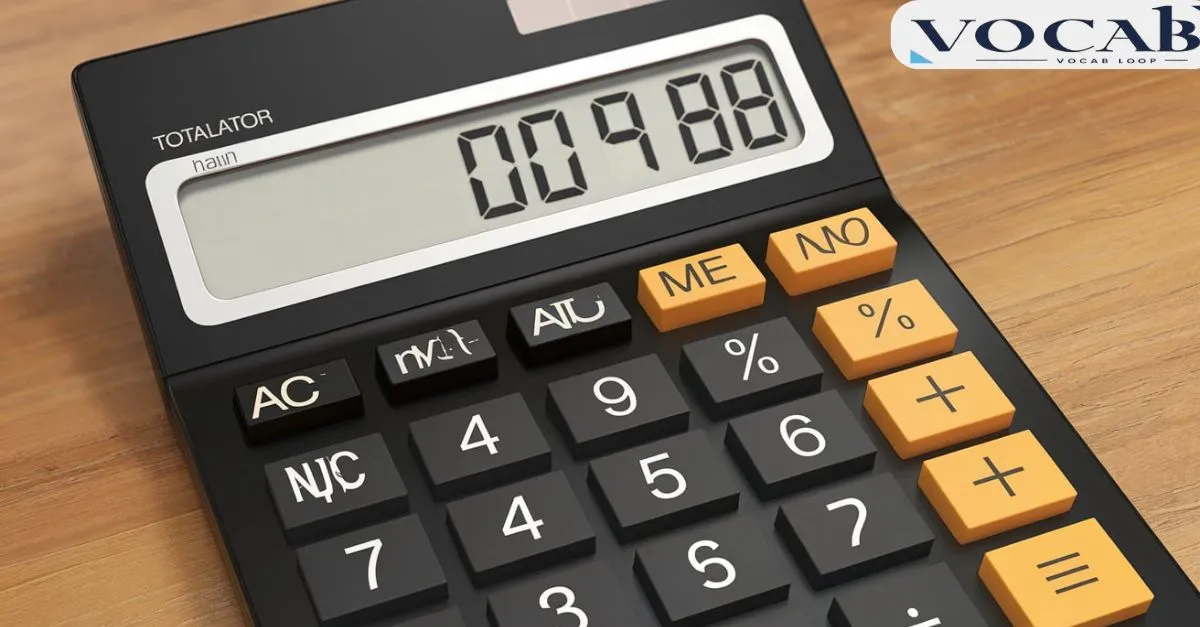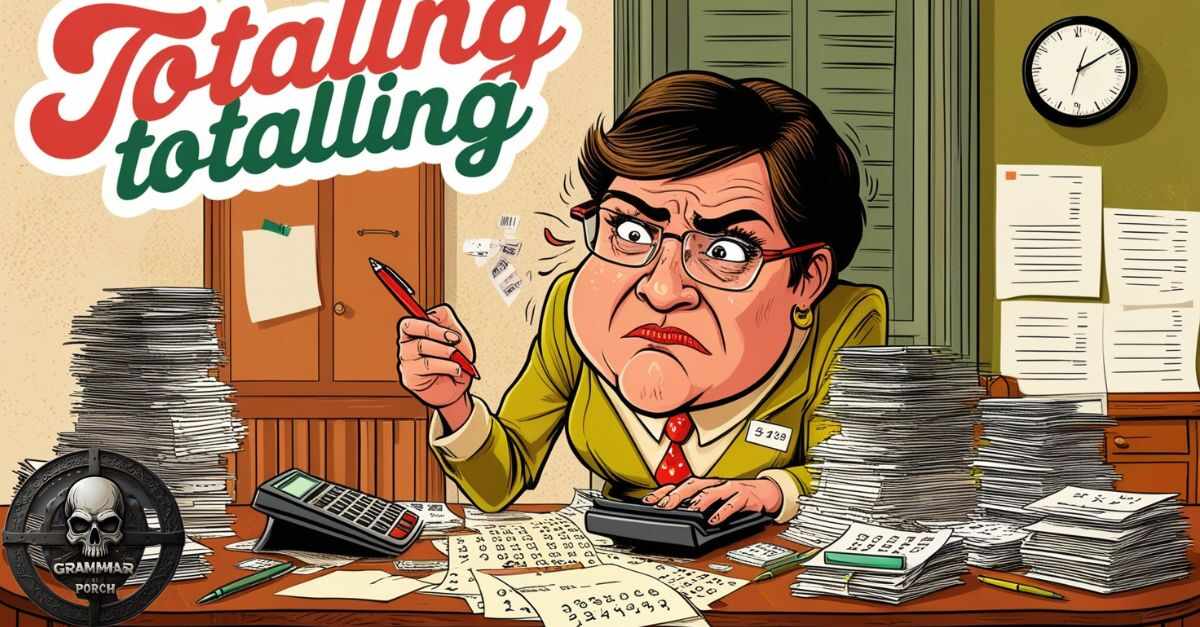Understanding the difference between totalling and totaling can be confusing, especially with English variations like British English and American English. Both spellings essentially mean the same thing, they refer to adding up, summing, or calculating a total sum. However, which one is correct depends on where you are or who you’re writing for.
This article clears up the spelling difference by explaining which version to use, how they’re used, and why there’s a regional variation.Let’s dive deep into this topic by looking at definitions, meanings, grammar usage, and some tricks to remember which form to use when writing in either British or American style.
What is There Confusion Between Totalling or Totaling?
People often get confused by totalling and totaling because English has two main variations with distinct spelling norms. British English often doubles the “l” in certain words when adding suffixes, while American English typically doesn’t. This results in two accepted spellings for many words, like “travelling” vs. “traveling” and “modelling” vs. “modeling.”
For totalling and totaling, the confusion is simply part of this larger language variation.If you’re wondering which to use, it really depends on your target audience. Totalling with two “l”s is standard in the UK and many Commonwealth countries. Meanwhile, totaling with a single “l” is the norm in the U.S. Knowing this difference can prevent spelling errors and improve your writing.
Is the Totalling Word Correct?

Definition:
Totalling is the British English form of the word, meaning to calculate a total, sum up, or aggregate multiple numbers or items. It follows British spelling conventions that often double the final consonant when a verb ends in a stressed syllable and a suffix is added.
In this case, totalling involves taking the word “total” and adding the suffix “-ing,” while retaining the double “l” to align with British grammar standards.
Meaning:
In everyday use, totalling means the process of adding items together to reach a sum. It can refer to financial calculations, like totaling up expenses, or to tallying votes in an election.
Although totalling and totaling mean the same thing, the spelling totalling is considered correct in British English. Using totalling in writing signifies a British audience, showing an adherence to UK spelling rules and British linguistic norms.
Is the Totaling Word Correct?
Definition:
Totaling is the American English variant, in which the second “l” is omitted. American English grammar tends to streamline spelling, so words that have double consonants in British English are often simplified to a single consonant.
Totaling, therefore, is the correct spelling in the U.S., aligning with American grammar and spelling conventions.
Meaning:
Similar to totalling, totaling refers to the act of calculating a total amount, summing numbers, or adding figures. It’s commonly used in contexts such as adding up costs, votes, or scores.
In the U.S., totaling is the standard form, fitting with US spelling norms. If you’re targeting an American audience, using totaling will feel familiar and appropriate.
Totalling or Totaling: What’s the Difference?

The spelling difference between totalling and totaling boils down to regional spelling rules. In British English, verbs ending in a stressed syllable often keep a double consonant when a suffix like “-ing” is added. Therefore, totalling is standard in British English. American English, however, tends to simplify by dropping one of the consonants, resulting in totaling.
This difference is one of many that exists between British and American English. While both forms are correct, choosing the right one depends on the target audience and the regional conventions they are accustomed to. For a writer, understanding these conventions is crucial to ensure clarity and credibility. Using totaling in British writing can appear incorrect, just as using totalling in American English might look out of place.
Quick Summary: Totalling or Totaling
| English Variant | Correct Spelling | Example |
| British English | Totalling | “They were totalling the results of the survey.” |
| American English | Totaling | “They were totaling the results of the survey.” |
This table provides a quick reference. If you’re writing for a British audience, stick with totalling, and if you’re writing for an American audience, go with totaling.
Totalling or Totaling as a Part of Speech
Both totalling and totaling act as verbs, and they function in similar ways. They’re present participles, meaning they describe an ongoing action. They can also function as gerunds, taking on a noun-like role in phrases like “the totalling of expenses” or “the totaling of accounts.”
In both cases, they describe an action related to summing up numbers or calculating a total. For example, you might say, “The totalling of items was tedious,” or “The totaling of items was tedious.”
Pronunciation of Totalling or Totaling
The pronunciation of totalling and totaling is the same in both British and American English, despite the spelling difference. Both are pronounced as /ˈtoʊtəlɪŋ/ with the stress on the first syllable. Whether you’re using the double “l” or the single “l,” the sound remains the same.
Side-by-Side Comparison of Totalling or Totaling in Detail
| Feature | Totalling | Totaling |
| Language Variant | British English | American English |
| Double “l” | Yes | No |
| Part of Speech | Verb/Gerund | Verb/Gerund |
| Meaning | Adding up, summing, totaling | Adding up, summing, totaling |
| Example | “Totalling expenses” | “Totaling expenses” |
Which One is More Acceptable: Totalling or Totaling?

While both totalling and totaling are acceptable in English, their acceptability depends on the regional audience. In American English, totaling is more acceptable and preferred. It adheres to the American spelling style, which values simpler, less redundant spellings.
In British English, totalling is the preferred form, aligning with British grammar rules that favor the double consonant in these types of words. Writers should keep their audience in mind, choosing totalling for UK-based readers and totaling for U.S.-based readers.
Totalling in British English
In British English, totalling with two “l”s is correct. This form follows British spelling rules, which often retain double consonants when a suffix is added. British English uses this form in all types of writing, from official documents to everyday communication, making it the standard spelling across the UK and many Commonwealth nations.
This is consistent with other words that British English spells with a double consonant, such as “modelling,” “travelling,” and “cancelling.”
Totaling in American English
In American English, totaling with one “l” is the accepted form. It fits with American writing conventions that prioritize streamlined spelling by removing unnecessary letters. This simpler spelling is found in all types of American English writing, from academic texts to casual emails.
Using totaling aligns with the broader tendency in American English to simplify spellings, which can also be seen in words like “canceled,” “labeled,” and “modeled.”
Common Mistakes of Totalling or Totaling and How to Avoid Them
One common mistake involves mixing British and American spellings, which can make writing look inconsistent or incorrect. For example, using totalling in American English or totaling in British English can lead to spelling errors. These inconsistencies often occur when writers use both forms interchangeably without realizing the difference, especially in mixed-audience content.
To avoid these mistakes, choose one form based on your target audience and stick with it throughout your writing. Another useful tool is a grammar checker like Grammarly or Microsoft Word, which can help identify the appropriate spelling based on the language setting.
Trick to Remember the Difference Between Totalling and Totaling
A helpful trick for remembering the difference is to focus on the root word “total.” In American English, you only need to add “-ing” to create totaling, without changing the root word.
In British English, add an extra “l” to follow the rule of doubling consonants before adding a suffix in stressed syllables. This trick can be applied to other similar word pairs like “traveling” vs. “travelling” or “cancelling” vs. “canceling.”
Origins of Totalling or Totaling

The difference between totalling and totaling originates from historical shifts in English spelling. British English spelling conventions were influenced by early dictionaries and language standards, which often retained double consonants when verbs ended in stressed syllables.
On the other hand, American English was shaped by efforts to simplify and standardize spelling, spearheaded by lexicographers like Noah Webster in the 19th century. Webster’s influential dictionary promoted simpler spellings, which is why American English often uses single consonants in these cases.
Totalling:
The origin of totalling lies in British linguistic norms, which favor retaining double consonants to reflect phonetic stress patterns.
Historically, British English kept the original forms of many words derived from Latin and Old English, leading to a spelling style that often looks more complex than its American counterpart.
Totaling:
The American variant, totaling, evolved with the aim of creating a more streamlined and accessible spelling system. Early American dictionaries removed double consonants in stressed syllables, favoring phonetic simplicity.
Thus, totaling became the standard spelling in American English, along with similar spellings like modeling and labeling.
Synonyms of Totalling or Totaling
Synonyms for totalling and totaling capture the idea of summing up, calculating, and adding numbers.
Totalling:
- Summing
- Aggregating
- Tallying
- Accumulating
- Computing
- Calculating
- Adding up
- Counting
- Tabulating
- Reckoning
Totaling:
- Summing
- Counting up
- Amassing
- Gathering
- Aggregating
- Tabulating
- Collating
- Tallying
- Reckoning
- Compiling
Daily Usage of sentences

Totalling:
- The finance team was totalling expenses for the annual report.
- She spent hours totalling the scores of the competition.
- They are totalling the votes from each district.
- We are totalling the miles driven over the past month.
- The accountant is totalling the company’s expenses for tax season.
- After the shopping trip, he started totalling all the receipts.
- I’m totalling up the points from each game.
- The volunteers were busy totalling donations from the event.
- The teacher was totalling the grades for the semester.
- The board is totalling the results of the survey.
Totaling:
- The cashier is totaling the items for checkout.
- I’m totaling my expenses for the month.
- They started totaling the votes right after the polls closed.
- We’re totaling the cost of the renovations.
- The project manager is totaling the hours worked.
- He was totaling the earnings for each quarter.
- She’s totaling the weight of the shipments.
- The accountant was totaling the deductions.
- The treasurer was totaling the donations.
- We are totaling the final count for the inventory.
FAQs
Can I use totalling in American English?
While you can use totalling in American English, it may appear as a typo since the preferred American spelling is totaling.
Why does British English double the “l” in totalling?
British English follows rules that often retain double consonants in verbs ending with a stressed syllable when adding suffixes.
How can I avoid mixing up totalling and totaling?
Remember to use totalling for British audiences and totaling for American ones. You can also use language tools to check spelling.
Do totalling and totaling mean the same thing?
Yes, both words mean the same: to calculate or add up to a total.
Is totaling the standard spelling worldwide?
No, totaling is the standard in American English, while totalling is standard in British English.
Conclusion
Between totalling and totaling, both forms are correct, yet their use depends on your audience. British English favors the double “l” in totalling, aligning with its tendency to retain traditional spellings. American English simplifies the spelling to totaling, reflecting its preference for streamlined language.
By understanding the regional spelling rules, writers can communicate effectively with audiences across the globe without unnecessary confusion. Whether you’re tallying, summing, or calculating, choosing the right spelling makes your writing clear, polished, and professional for the intended readers.

Larry is an experienced blogger with a passion for simplifying grammar. With years of expertise in writing and language, he shares insightful tips on punctuation, synonyms, and the intricacies of English grammar at **Grammar Porch**. His approachable style helps readers improve their writing skills with ease.

